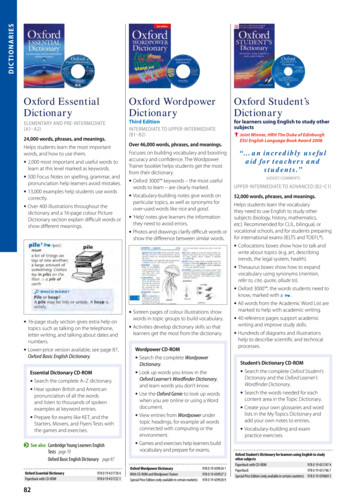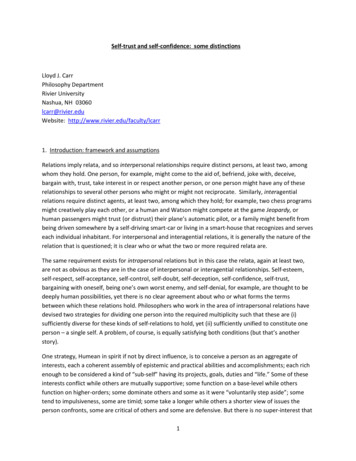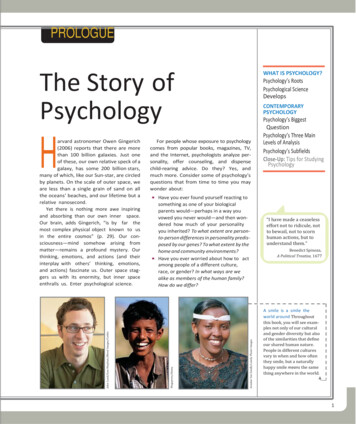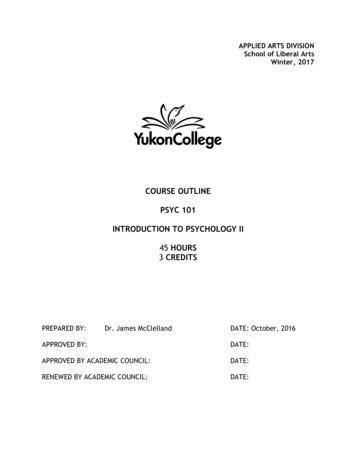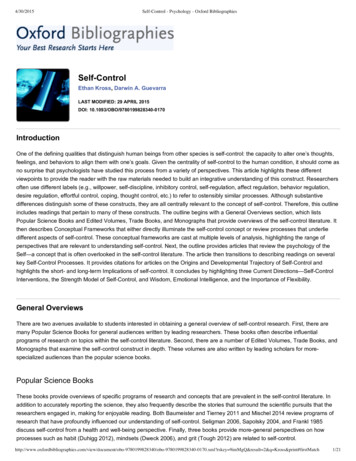
Transcription
4/30/2015Self-Control - Psychology - Oxford BibliographiesSelf ControlEthan Kross, Darwin A. GuevarraLAST MODIFIED: 29 APRIL 2015DOI: 10.1093/OBO/9780199828340 0170IntroductionOne of the defining qualities that distinguish human beings from other species is self control: the capacity to alter one’s thoughts,feelings, and behaviors to align them with one’s goals. Given the centrality of self control to the human condition, it should come asno surprise that psychologists have studied this process from a variety of perspectives. This article highlights these differentviewpoints to provide the reader with the raw materials needed to build an integrative understanding of this construct. Researchersoften use different labels (e.g., willpower, self discipline, inhibitory control, self regulation, affect regulation, behavior regulation,desire regulation, effortful control, coping, thought control, etc.) to refer to ostensibly similar processes. Although substantivedifferences distinguish some of these constructs, they are all centrally relevant to the concept of self control. Therefore, this outlineincludes readings that pertain to many of these constructs. The outline begins with a General Overviews section, which listsPopular Science Books and Edited Volumes, Trade Books, and Monographs that provide overviews of the self control literature. Itthen describes Conceptual Frameworks that either directly illuminate the self control concept or review processes that underliedifferent aspects of self control. These conceptual frameworks are cast at multiple levels of analysis, highlighting the range ofperspectives that are relevant to understanding self control. Next, the outline provides articles that review the psychology of theSelf—a concept that is often overlooked in the self control literature. The article then transitions to describing readings on severalkey Self Control Processes. It provides citations for articles on the Origins and Developmental Trajectory of Self Control andhighlights the short and long term Implications of self control. It concludes by highlighting three Current Directions—Self ControlInterventions, the Strength Model of Self Control, and Wisdom, Emotional Intelligence, and the Importance of Flexibility.General OverviewsThere are two avenues available to students interested in obtaining a general overview of self control research. First, there aremany Popular Science Books for general audiences written by leading researchers. These books often describe influentialprograms of research on topics within the self control literature. Second, there are a number of Edited Volumes, Trade Books, andMonographs that examine the self control construct in depth. These volumes are also written by leading scholars for more specialized audiences than the popular science books.Popular Science BooksThese books provide overviews of specific programs of research and concepts that are prevalent in the self control literature. Inaddition to accurately reporting the science, they also frequently describe the stories that surround the scientific pursuits that theresearchers engaged in, making for enjoyable reading. Both Baumeister and Tierney 2011 and Mischel 2014 review programs ofresearch that have profoundly influenced our understanding of self control. Seligman 2006, Sapolsky 2004, and Frankl 1985discuss self control from a health and well being perspective. Finally, three books provide more general perspectives on howprocesses such as habit (Duhigg 2012), mindsets (Dweck 2006), and grit (Tough 2012) are related to self ml?rskey 9imMgQ&result 2&q Kross&print#firstMatch1/21
4/30/2015Self-Control - Psychology - Oxford BibliographiesBaumeister, R. F., and J. Tierney. 2011. Willpower: Rediscovering the greatest human strength. New York: Penguin.This book provides an overview of the consequences associated with high and low self control, why people fail at it, and how toimprove it. It pulls from the strength model of self control, which conceptualizes self control as a muscle that is capable of beingdepleted and strengthened.Duhigg, C. 2012. The power of habit: Why we do what we do in life and business. New York: Random House.This book provides an introduction to the psychology of habits. It reviews how habits are formed and how they can be changed viaself control.Dweck, C. S. 2006. Mindset: The new psychology of success. Concentrated Knowledge for the Busy Executive. New York:Random House.This book describes how mindsets influence motivation and behavior. It describes two types of mindsets—a fixed mindset (thebelief that things cannot be changed) and a growth mindset (the belief that things can be changed)––and details how theyinfluence one’s thoughts, feelings, and behavior.Frankl, V. E. 1985. Man’s search for meaning. New York: Simon & Schuster.In this classic, first published in 1946 (London: Hodder & Stoughton), Frankl uses his experience as a concentration camp prisonerduring the Holocaust as a basis for deriving a theory about psychological resilience that focuses on meaning making. He arguesthat negative experiences are unavoidable, but people’s ability to make meaning out of them determines how they respond.Mischel, W. 2014. The marshmallow test: Mastering self control. New York: Little, Brown.This book describes Mischel’s seminal research program on delay of gratification. It describes the processes that underlie delay ofgratification, as well as implications that the ability to delay gratification and self control more generally have for health, well being,relationships, human nature, and public policy.Sapolsky, R. M. 2004. Why zebras don’t get ulcers. 3d ed. New York: Henry Holt.This book explains how stress can undermine physical and psychological well being. It also describes strategies people can use toenhance their ability to control stress and to improve their well being and health.Seligman, M. E. P. 2006. Learned optimism: How to change your mind and your life. New York: Vintage.This book is borne out of the cognitive therapy tradition. It delineates the cognitive signature of pessimistic and optimistic thinking.It discusses the benefits of an optimistic mindset for various life domains and offers exercises to measure and build optimism.Tough, P. 2012. How children succeed: Grit, curiosity, and the hidden power of character. Boston: Houghton MifflinHarcourt.This book argues that “grit” (i.e., one’s perseverance and passion for pursuing long term goals) is central to children’s ability tosucceed in work and life. It integrates findings from psychology and neuroscience to bolster its l?rskey 9imMgQ&result 2&q Kross&print#firstMatch2/21
4/30/2015Self-Control - Psychology - Oxford BibliographiesEdited Volumes, Trade Books, and MonographsThese edited volumes, trade books, and monographs provide a more in depth survey of self control than the cited Popular ScienceBooks. Four handbooks (Forgas, et al. 2009; Gross 2014; Hassin, et al. 2010; Vohs and Baumeister 2010) provide a broadoverview of the myriad processes involved in self control. Bandura 1997 and Carver and Scheier 1998 review two influentialtheories in the self control literature—self efficacy and cybernetic theory of self control, respectively. Finally, Rachlin 2000 providesa behaviorist view of self control that forges important bridges to economics.Bandura, A. 1997. Self efficacy: The exercise of control. New York: W. H. Freeman.This book provides an overview of “self efficacy” (i.e., the belief of a person in his or her own competence). The first part describesthe conceptual origins of self efficacy. The second part situates self efficacy in six areas of human functioning (i.e., cognitive,health, clinical, athletic, organizational, and international).Carver, C. S., and M. F. Scheier. 1998. On the self regulation of behavior. New York: Cambridge Univ. Press.This book reviews one of the most influential frameworks for conceptualizing self control: the cybernetic theory of self control. Itdiscusses the principles of feedback control and the relation of this process to goals in producing behavior. It is required reading forany student of self control.Forgas, J. P., R. F. Baumeister, and D. M. Tice, eds. 2009. Psychology of self regulation: Cognitive, affective, andmotivational processes. Sydney Symposium of Social Psychology 11. New York: Psychology Press.This handbook divides into three sections: motivational processes in self regulation, self regulation and goal oriented behavior, andaffective and cognitive processes in self regulation.Gross, J. J., ed. 2014. Handbook of emotion regulation. 2d ed. New York: Guilford.This handbook provides an up to date overview of the literature on emotion regulation. It reviews the conceptual foundations ofemotion regulation, including biological, cognitive, and developmental influences. It also describes how social context andpersonality affect emotion regulation. Lastly, it reviews the relationship among emotion regulation, psychopathology, and health.Hassin, R. R., K. N. Ochsner, and Y. Trope, eds. 2010. Self control in society, mind, and brain. Oxford Series in SocialCognition and Social Neuroscience. New York: Oxford Univ. Press.This handbook consists of chapters that discuss how self control works at multiple levels of analysis, including social, cognitive,and neuroscience. It divides into three sections: the neural processes that underlie self control, the social cognitive processesinvolved in self control, and self control in groups and society.Rachlin, H. 2000. The science of self control. Cambridge, MA: Harvard Univ. Press.The book examines self control through the lens of behavioral psychology and economics. It discusses impulsiveness, habit,addiction, craving, and the processes involved in overcoming or succumbing to 0.xml?rskey 9imMgQ&result 2&q Kross&print#firstMatch3/21
4/30/2015Self-Control - Psychology - Oxford BibliographiesVohs, K. D., and R. F. Baumeister, eds. 2010. Handbook of self regulation: Research, theory, and applications. 2d ed. NewYork: Guilford.This handbook provides an overview of research on self regulation. It includes chapters from self regulation experts working in avariety of different areas of psychology, including social personality, clinical, developmental, cognitive neuroscience, andbiopsychology.Conceptual FrameworksWhat is self control? How does it work? Because self control is relevant to multiple subdisciplines of psychology, researchers useconceptual frameworks and methodologies that span multiple levels of analysis to answer these questions. The following sectionlists classic and more recent papers that either have been or have the potential to be particularly influential in shaping the waypeople think about self control (also see Bandura 1997 and Carver and Scheier 1998, cited in Edited Volumes, Trade Books, andMonographs). This section organizes these articles into those that can be classified as falling primarily under the Social Personality Developmental Level of Analysis and the Cognitive and Biological Level of Analysis.Social Personality Developmental Level of AnalysisThis section highlights papers that address issues relevant to self control through the lenses of social psychology, social cognition,personality psychology, and developmental psychology. Although some of the articles listed below focus exclusively on one ofthese levels of analysis, many of them integrate across multiple levels. This section begins by providing citations to four broadtheories of self control. Baumeister, et al. 2007 focuses on self control as a limited resource; Fujita 2011 argues for a broaderconceptualization of self control that entertains the notion that it can be exerted effortlessly; Metcalfe and Mischel 1999 andHofmann, et al. 2009 propose dual process frameworks for understanding self control. Turning to models that focus specifically onemotion regulation, Gross 1998 proposes a process model of emotion regulation, while Charles 2010 uses an emotion regulationframework to understand why people become more resilient as they age. Finally, Higgins 1997 describes the origins andconsequences of two key self regulatory orientations that govern the way people think, feel, and behave, while Myrseth andFishbach 2009 highlights the importance of conflict monitoring in the authors’ two stage model of self control.Baumeister, R. F., K. D. Vohs, and D. M. Tice. 2007. The strength model of self control. Current Directions inPsychological Science 16.6: 351–355.This article provides an overview of the strength model of self control. It identifies activities that require self control, suggests thatself control is limited and can be depleted with use, and argues that glucose is the biological basis for this limited resource.Charles, S. T. 2010. Strength and vulnerability integration: A model of emotional well being across adulthood.Psychological Bulletin 136.6: 1068–1091.This article explains why negative emotional experiences decline across adulthood, whereas positive emotional experiencesincrease over the same time span. It suggests that people become more adept at emotion regulation as they age.Fujita, K. 2011. On conceptualizing self control as more than the effortful inhibition of impulses. Personality and SocialPsychology Review 15.4: 352–366.This article argues that conceptualizing self control as the effortful inhibition of impulses is limiting and problematic. ey 9imMgQ&result 2&q Kross&print#firstMatch4/21
4/30/2015Self-Control - Psychology - Oxford Bibliographiesconceptualizes self control as a process that allows people to advance abstract, long term goals over short term, concrete ones,and suggests that this process can be effortless.Gross, J. J. 1998. The emerging field of emotion regulation: An integrative review. Review of General Psychology 2.3:271–299.This paper provides an overview of the concept of emotion regulation. It advances a process model of emotion regulation thatconsists of five stages: situation selection, situation modification, attentional deployment, cognitive change, and responsemodulation.Higgins, E. T. 1997. Beyond pleasure and pain. American Psychologist 52.12: 1280–1300.This article provides a framework for understanding how the way people approach pleasure and avoid pain influences self regulation. It distinguishes between a promotion focus (focusing on accomplishments and aspirations) and a prevention focusorientation (focusing on safety and responsibilities) and describes the cognitive and emotional consequence of these orientations.Hofmann, W., M. Friese, and F. Strack. 2009. Impulse and self control from a dual systems perspective. Perspectives onPsychological Science 4.2: 162–176.This article presents a model of self control that emphasizes the role of desire. It suggests that two systems support self control: animpulsive system and a reflective system. It posits that the interactions between these systems along with situational anddispositional factors predict self control outcomes and behavior.Metcalfe, J., and W. Mischel. 1999. A hot/cool system analysis of delay of gratification: Dynamics of willpower.Psychological Review 106.1: 3–19.This paper suggests that self control is the function of the interplay of two constantly interacting systems: an impulsive, “hot”system and a reflective “cool” system. It pulls heavily from research on delay of gratification to support its claims and speculatesabout the neural processes underlying hot/cool system functioning.Myrseth, K. O. R., and A. Fishbach. 2009. Self control: A function of knowing when and how to exercise restraint. CurrentDirections in Psychological Science 18.4: 247–252.This article proposes a model of self control that consists of a conflict identification stage and conflict resolution stage. It reviewsvariables that affect how people respond during both of these self control stages.Cognitive and Biological Level of AnalysisThe period since the end of the 20th century has seen an explosion of research attempting to link mind and body in the context ofself control. This work is rapidly illuminating the biological substrates of self control by allowing us to understand for the first timethe “hardware” that makes self control possible. The interdisciplinary nature of this work is also beginning to create, and in somecases has already forged, strong bridges between different areas of research (e.g., social personality psychology, cognitivepsychology, neuroscience) that have historically operated in isolation. In some cases, these interdisciplinary efforts have creatednew areas of research such as affective neuroscience, social neuroscience, and cognitive neuroscience. Therefore, this sectionhighlights a number of articles that have explored the biological bases of self control. Botvinick, et al. 2001; Heatherton 2011; key 9imMgQ&result 2&q Kross&print#firstMatch5/21
4/30/2015Self-Control - Psychology - Oxford BibliographiesOchsner, et al. 2012 discuss the neural bases of self control processes, including executive function. Diamond 2013 provides anup to date review of executive function, and Hofmann, et al. 2012 links self regulation with executive function. Gunnar andQuevedo 2007 reviews self control and endocrine processes, Brosschot, et al. 2005 focuses on autonomic profiles, and Zhang andMeaney 2010 discusses epigenetic processes. These works highlight the breadth and richness of work being conducted on thistopic.Botvinick, M. M., T. S. Braver, D. M. Barch, C. S. Carter, and J. D. Cohen. 2001. Conflict monitoring and cognitive control.Psychological Review 108.3: 624–652.This article uses neuroscientific findings to explain how people monitor for conflicts that cue the need for cognitive control—aprocess that is intimately linked to the concept of self control. It also describes the relationship between conflict monitoring andcognitive control.Brosschot, J. F., S. Pieper, and J. F. Thayer. 2005. Expanding stress theory: Prolonged activation and perseverativecognition. Psychoneuroendocrinology 30.10: 1043–1049.The authors describe how people’s cognitive representations of stressors affect the duration of potentially harmful physiologicalresponses such as delayed reactivity of the autonomic nervous system. It focuses on the role that perseverating over stressorsplays in enhancing vulnerability to disease.Diamond, A. 2013. Executive functions. Annual Review of Psychology 64:135–168.This article reviews the literature on executive functions and breaks down core processes into inhibition and interference control,working memory, and cognitive flexibility. It also discusses developmental trajectories, training, and the importance of theseprocesses.Gunnar, M., and K. Quevedo. 2007. The neurobiology of stress and development. Annual Review of Psychology 58:145–173.The ability to effectively regulate stress responses is a key self control challenge. The authors review the literature on thepsychobiology of stress responses and the role that social regulatory processes and individual differences play in stress responseoutcomes during critical developmental periods.Heatherton, T. F. 2011. Neuroscience of self and self regulation. Annual Review of Psychology 62:363–390.This article discusses the neural bases of self control and makes a case for the limited resource view of self regulation.Hofmann, W., B. J. Schmeichel, and A. D. Baddeley. 2012. Executive functions and self regulation. Trends in CognitiveSciences 16.3: 174–180.The authors argue that executive function is intimately linked with self regulation, and they emphasize the need for morecommunication across disciplines. They also argue that basic components of executive function promote successful self regulation.Ochsner, K. N., J. A. Silvers, and J. T. Buhle. 2012. Functional imaging studies of emotion regulation: A synthetic ?rskey 9imMgQ&result 2&q Kross&print#firstMatch6/21
4/30/2015Self-Control - Psychology - Oxford Bibliographiesand evolving model of the cognitive control of emotion. In Special issue: The year in cognitive neuroscience. Annals ofthe New York Academy of Sciences 1251.1: E1–E24.This article reviews findings on the neural systems involved in emotion generation and emotion regulation. It identifies brain regionsthat support a widely investigated emotion regulation strategy called reappraisal. It also discusses the neural correlates associatedwith other strategies, such as situation selection and modification, attentional deployment, and response modulation.Zhang, T. Y., and M. J. Meaney. 2010. Epigenetics and the environmental regulation of the genome and its function.Annual Review of Psychology 61:439–466.Researchers have long acknowledged the role that genes play in self control. This article describes how environments influencegene expression. It demonstrates that genes are not destined to influence an organism’s behavior—an observation that hasenormous relevance for our understanding the potential malleability of self control.The SelfCentral to the concept of “self control” is the notion that there is a “self” that is either in control or being controlled. But what is theself? How does one’s concept of the self develop over time and is it malleable? And importantly, what role does the self play in“self control”? This section outlines a number of resources that touch on these questions. It is important to recognize from theoutset that although the concept of “the self” is intimately linked with self control, it is also related to a host of additionalphenomena, which are outside the scope of this review. Therefore, this section provides a comprehensive bibliographic guide onthe psychology of the self, (Guenther and Alicke 2013), as well as a reference to a handbook on the self (Leary and Tangney2012), which brings together leading researchers to discuss various aspects of the self, including those related specifically to self control. This section then lists a number of papers that offer different views on how to conceptualize the self. James 1890discusses what constitutes the self, while Markus and Kitayama 1991 focuses on the self from a cultural standpoint. Markus andNurius 1986 discusses possible selves, and McAdams 1993 talks about the self from a narrative standpoint. Moreover, Shermanand Cohen 2006 discusses self maintenance processes, and Wilson 2009 reviews self knowledge—two processes that haveimportant implications for self control.Guenther, C. L., and M. D. Alicke. 2013. Psychology of the self. In Oxford Bibliographies in Psychology. New York: OxfordUniv. Press.This resource provides a comprehensive list of relevant books and articles on the psychology of the self.James, W. 1890. The consciousness of self. In The principles of psychology. Vol. 1. By W. James, 291–401. New York:Henry Holt.In this classic chapter, James discusses what constitutes the self, the feelings that arise from the self, and the actions that areprompted by the self. This is required reading for any reader who is interested in the self. Republished as recently as 2010(Memphis, TN: General Books).Leary, M. R., and J. P. Tangney, eds. 2012. Handbook of self and identity. 2d ed. New York: Guilford.This handbook provides an up to date review of research on the self. It is divided into four parts: (1) awareness, cognition, andregulation; (2) evaluation, motivation, and emotion; (3) interpersonal behavior and culture; and (4) physiological, phylogenetic, anddevelopmental 170.xml?rskey 9imMgQ&result 2&q Kross&print#firstMatch7/21
4/30/2015Self-Control - Psychology - Oxford BibliographiesMarkus, H. R., and S. Kitayama. 1991. Culture and the self: Implications for cognition, emotion, and motivation.Psychological Review 98.2: 224–253.This article suggests that it is possible to construe the self in independent (emphasis on unique expression of personalcharacteristics) or interdependent (emphasis on harmonious interactions with others) terms, and that people from different culturesdiffer systematically in the self construals they adopt, which influences their thoughts, feelings, and behavior.Markus, H., and P. Nurius. 1986. Possible selves. American Psychologist 41.9: 954–969.This article introduces the concept of “possible selves”— ideas people harbor about what they may become, would like to become,or are afraid of becoming.McAdams, D. P. 1993. The stories we live by: Personal myths and the making of the self. New York: Guilford.The author argues that the self is the product of stories that people construct about themselves. He discusses how people can altertheir personal narratives and the consequences of doing so.Sherman, D. K., and G. L. Cohen. 2006. The psychology of self defense: Self affirmation theory. In Advances inexperimental social psychology. Vol. 38. Edited by M. P. Zanna, 183–242. New York: Academic Press.This article summarizes research on self affirmation theory, which posits that people are motivated to maintain self integrity. Itdescribes the processes involved in self integrity maintenance, and its implications for interpersonal relationships, coping, andhealth.Wilson, T. D. 2009. Know thyself. Perspectives on Psychological Science 4.4: 384–389.This paper describes recent theoretical developments in self knowledge research. It then discusses the negative outcomesassociated with having low self knowledge and identifies ways of improving self knowledge.Self Control ProcessesPsychologists have identified a number of processes that are involved in self control. This section highlights four key processes: (1)Motivation, Goals, and Planning, (2) Attention Allocation, (3) Cognitive Change, and (4) Suppression. It is important to recognizethat the line separating many of these categories is murky. For example, some attention allocation strategies involve certaindegrees of cognitive change, and cognitive change is certainly involved in motivation, goals, and planning. This conceptual overlapnotwithstanding, this section organizes articles so that they fit under the category headings that best capture their dominantfeatures. Until a comprehensive framework emerges for integrating these processes, this format provides the most parsimoniousway of presenting this information.Motivation, Goals, and PlanningPeople can have myriad self control tools at their disposal, but if they are not properly motivated to use those tools it is unlikely thatthey will exert self control. This section reviews a number of articles that bear on this issue, focusing on the role that motivation,goals, and planning play in self control. Two of the articles provide broad frameworks for thinking about how concepts such ey 9imMgQ&result 2&q Kross&print#firstMatch8/21
4/30/2015Self-Control - Psychology - Oxford Bibliographiesmotivation, goals, and planning influence self control. Dweck and Leggett 1988 describes how people’s implicit theories orient themtoward particular goals and, consequently, particular patterns of thought, feelings, and behavior. Aspinwall and Taylor 1997discusses the anticipatory processes that help people manage problematic situations before they arise. This section then presentsarticles that discuss the role that four sets of processes play in helping maximize the likelihood that people achieve their self regulatory goals—Ariely and Wertenbroch 2002 discusses deadlines, Gollwitzer and Sheeran 2006 reviews work onimplementation intentions, Trope and Fishbach 2000 describes the role that counteractive self control processes play in self regulation, and Duckworth, et al. 2007 introduces grit. Finally, Ordóñez, et al. 2009 reviews the potential harmful effects of goalsetting.Ariely, D., and K. Wertenbroch. 2002. Procrastination, deadlines, and performance: Self control by precommitment.Psychological Science 13.3: 219–224.This article explains how people can exert self control by precommitting to a goal—setting costly deadlines for themselves. It alsodemonstrates that people’s self imposed deadlines are less effective than externally imposed deadlines in helping them achievetheir goals.Aspinwall, L. G., and S. E. Taylor. 1997. A stitch in time: Self regulation and proactive coping. Psychological Bulletin121.3: 417–436.The authors provide a framework for understanding the anticipatory processes that help people manage problematic situationsbefore they arise, discussing the role that individual differences, skills, and resources play in proactive, anticipatory coping.Duckworth, A. L., C. Peterson, M. D. Matthews, and D. R. Kelly. 2007. Grit: Perseverance and passion for long term goals.Journal of Personality and Social Psychology 92.6: 1087–1101.This article examines the importance of grit—a person’s perseverance and enthusiasm for accomplishing long term goals—forpredicting scholastic success. Shows that grit predicts success in a variety of educational domains over and beyond IQ.Dweck, C. S., and E. L. Leggett. 1988. A social cognitive approach to motivation and personality. Psychological Review95.2: 256–273.The authors argue that people’s implicit theories about whether things are changeable (an incremental view) or unchangeable (anentity
This book describes Mischel’s seminal research program on delay of gratification. It describes the processes that underlie delay of gratification, as well as implications that the ability to delay gratification and self control mor



